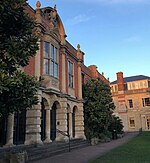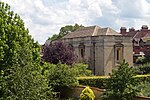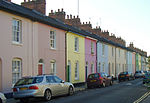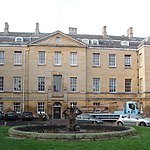Radcliffe Observatory Quarter
2009 establishments in EnglandBuildings and structures of the University of OxfordGreen Templeton College, OxfordPlanned developmentsUniversity of Oxford sites

The Radcliffe Observatory Quarter (ROQ) is a major University of Oxford development project in Oxford, England, in the estate of the old Radcliffe Infirmary hospital. The site, covering 10 acres (3.7 hectares) is in central north Oxford. It is bounded by Observatory Street and Green Templeton College to the north, the Woodstock Road to the east, Somerville College to the south, and Walton Street to the west. The project and the new university area is named after the grade I listed Radcliffe Observatory to the north east of the site, now the centrepiece of Green Templeton College, which is intended to form the visual centrepiece of the project.
Excerpt from the Wikipedia article Radcliffe Observatory Quarter (License: CC BY-SA 3.0, Authors, Images).Radcliffe Observatory Quarter
Woodstock Road, Oxford City Centre
Geographical coordinates (GPS) Address External links Nearby Places Show on map
Geographical coordinates (GPS)
| Latitude | Longitude |
|---|---|
| N 51.760555555556 ° | E -1.2638888888889 ° |
Address
Radcliffe Observatory Quarter
Woodstock Road
OX2 6HT Oxford, City Centre
England, United Kingdom
Open on Google Maps











